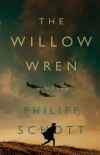The Willow Wren by Philipp Schott (free ebook reader for iphone txt) 📕

Read free book «The Willow Wren by Philipp Schott (free ebook reader for iphone txt) 📕» - read online or download for free at americanlibrarybooks.com
- Author: Philipp Schott
Read book online «The Willow Wren by Philipp Schott (free ebook reader for iphone txt) 📕». Author - Philipp Schott
I went back again and again that autumn, playing various games by myself but always stopping at least once to listen intently and to try to understand those birds. One day as I sat under Old Greybark, watching starlings squabble over a fallen apple, I realized something. Maybe being able to understand the language of birds did not mean to literally hear them as words. “Back off, Augustus! I saw this apple first!” Perhaps instead it meant to understand their intent in your mind, with the help of observation and a little imagination. This realization felt like the flipping of a switch. Suddenly everything looked and sounded quite different. Suddenly my forest on the Pleisse was full of characters living lives of drama and adventure. Little feathered heroes and villains, workers and philosophers, soldiers and kings. With this perspective I felt that I increasingly understood the meaning and intent of their songs. It was very much like the opera Papa listened to on his Grundig gramophone. You could not understand all the words, even when it was in German, but you roughly knew what was going on and what the singers felt. It was the language of emotion. The rest of that autumn I sat under Old Greybark as often as I could and watched and listened to my little opera stars.
This ended with the first snow, which came unusually early and heavy that year. Many birds left to migrate south and those birds who stayed for the winter were quieter. They seemed to draw more into themselves and away from interacting with others. I admired the ones who stayed, like the crows and the sparrows and the wrens. It was the first of several snowy and hard winters that would continue through the war.
“When circumstances forced me to part from Winnetou so that I could pursue the murderer Santer, I had no idea that it would be months before I would see my red friend and blood-brother again.”
So begins the great children’s novel Winnetou by Karl May.
To be honest, I cannot be certain about when I first read it. What I know is that it was after I discovered the language of the birds and that it was before the war started. I was a precocious child and reading such a novel before the age of five was entirely possible. Probable even. So the summer of 1938 feels about right. In any case, it had a strong effect on me. Possibly it changed the course of my life. Those first books without pictures that we read when we are children have a way of weaving themselves deep into the fabric of our subconscious.
I know now that Karl May’s melodramatic depiction of the American West is as far removed from reality as those cheap comic books my sons would later read. His great heroes are Old Shatterhand, a German living on the wild frontier, who became the blood brother of Winnetou, a Native American chief. They had all sorts of exciting if, admittedly, highly improbable adventures together. May is not at all fashionable, or even acceptable, to modern readers, but in his time he created a miracle of imagination and inspiration in a strange and often lonely boy. For this I am grateful. So many years later, I often still picture myself lying with my head towards the foot of my bed, propped up on my elbows, reading my Winnetou by stolen light leaking through the crack in my bedroom door, thankfully unaware that outside that door, war, like a dark growing stain as yet unseen, was swallowing our future.
I read Winnetou often enough that I knew long passages by heart and that my deepest and most desperate desire became to read the second, third and fourth volumes. We had many books in the house, but mostly the classics and hardly anything of interest to children, even precocious ones like me, except for the Brothers Grimm and Wilhelm Busch and the terrifying Struwwelpeter in which boys have their thumbs scissored off for sucking them and girls are turned into piles of ash for the grievous error of playing with matches. Karl May’s lessons were far less graphic and far subtler.
“Papa, may I speak to you please?” If I wanted any sort of answer other than a rebuke for my rudeness and impertinence it was important to begin correctly. I picked what I judged to be the perfect moment. From all appearances he had had a good morning at work and Mama was making one of his favourite lunches, pork cutlets in a wine sauce with boiled potatoes and steamed green beans. And as far as I could tell the headlines in his newspaper were mostly positive,





Comments (0)